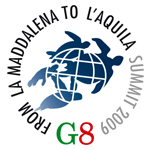
Summits | Meetings | Publications | Research | Search | Home | About the G7 Research Group
Follow @g7_rg

 |
Summits | Meetings | Publications | Research | Search | Home | About the G7 Research Group Follow @g7_rg |
 |

See also
• Joint Statement: Promoting the Global Agenda [html] [pdf]
• Annex 1: Concluding Report of the Heiligendamm Process [html] [pdf]
Brazil, Canada, the People’s Republic of China, France, Germany, India, Italy, Japan, Mexico, Russia, South Africa, the United Kingdom, the United States of America and the European Commission, hereafter referred to as “the Partners”, agree to continue their dialogue as the Heiligendamm – L’Aquila Process (HAP) for two years. They will review progress at the end of the first year on the basis of a substantive report to Leaders for guidance at the Summit in Muskoka in 2010. A concluding report will be presented at the French Summit in 2011. This Process, which is a policy dialogue aiming at strengthening mutual understanding in the spirit of the work already undertaken, will focus on areas of common interest to the Partners, be forward-looking and produce tangible results. It will also remain sufficiently flexible to respond to major challenges and help shape the future. This process will complement and add value to the work in international organizations and other fora and facilitate the search for common positions therein.
The HAP Steering Committee will have the flexibility to take up pressing global challenges. The aim is to address emerging and/or cross-cutting issues which have an impact on global development efforts or on which potential for meaningful collective progress is foreseen. The next meeting of the Steering Committee will decide how best to organize and structure the work within the broad areas.
Possible themes:
The HAP Steering Committee will be co-chaired by a G8 and a G5 partner country and its meetings will be held alternatively by a G8 and G5 partner country. The Steering Committee will have the necessary latitude and flexibility to organize the needed actions to ensure the Process is result-oriented in the areas of common interest. Consequently, it will take the needed actions, such as maintaining, modifying, and ending existing working groups or creating new ones. The Steering Committee can also decide to invite other countries and/or International Organizations to join the discussions of specific working groups, where appropriate, on a case-by-case basis. Partners recognize the positive work done by the HDP Support Unit and the OECD since 2007 and ask them to continue to support the Process in this new phase.
Source: Official Italian G8 website
 — 
|
This Information System is provided by the University of Toronto Libraries and the G7 Research Group at the University of Toronto. |
|
Please send comments to:
g7@utoronto.ca This page was last updated November 20, 2010. |
All contents copyright © 2024. University of Toronto unless otherwise stated. All rights reserved.